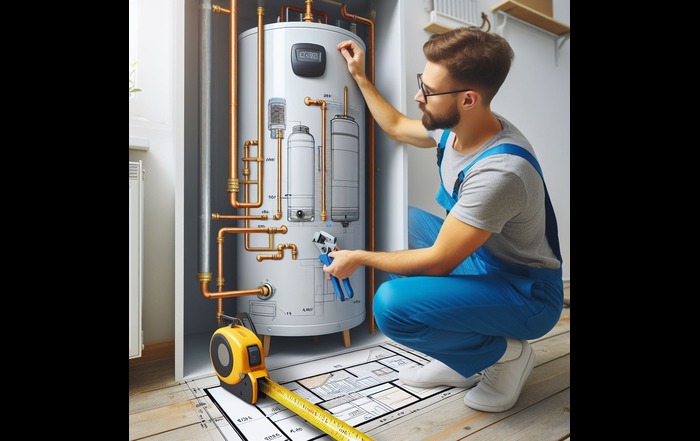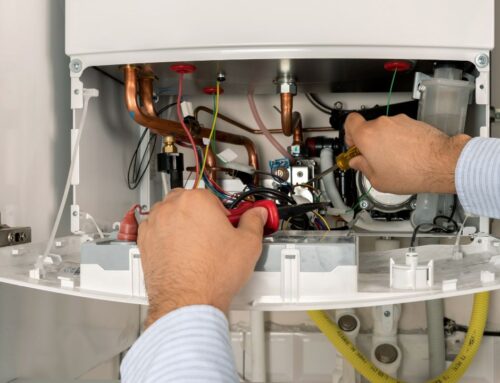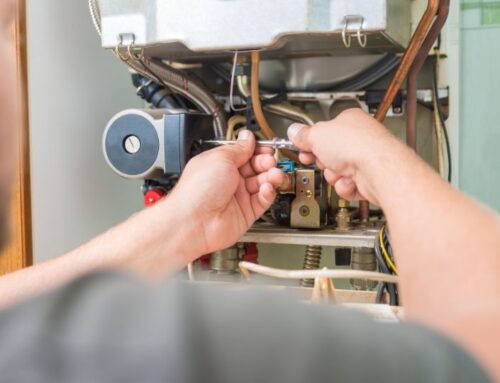Importance of Water Heater Sizing and Placement
In the world of cozy homes, getting the right-sized water heater is super important. This often-underappreciated machine becomes a big deal when it doesn’t work well. It’s a key player in our daily routines, from the morning shower to washing dishes in the evening. The size of your water heater really matters because it affects how well it works, how comfy you are, and even how safe you feel.
If your water heater is too small, you might end up freezing during your shower. On the flip side, if it’s too big, it can use up more energy than needed, costing you extra money. Choosing the right size isn’t just about having enough hot water, it’s also about keeping your home safe and energy-efficient.
Understanding Water Heater Sizing
Understanding the size of a water heater is about figuring out the right fit for your home or building. This is crucial because it ensures the water heater can meet your hot water needs without wasting energy. Getting the size right means you have enough hot water when you need it, and your water heater works efficiently, helping you save energy and reduce those utility bills.
To determine the size, we consider various factors like the number of people in your home, how much hot water you use, and when you use it the most. The peak demand, measured in gallons needed during the busiest hour, depends on factors like the number of bathrooms, appliances (such as dishwashers and washing machines), and the temperature rise required.
For instance, a family of 1-2 people might do well with a 30-50 gallon capacity, while a larger family of 5 or more might need at least 75 gallons. As you add more bathrooms or appliances, you might need even more capacity. Storage water heaters also involve calculating the first-hour rating, indicating how many gallons of hot water the heater can supply per hour with a full tank.
Tankless or demand-type water heaters focus on the flow rate and needed temperature rise. These heaters adjust their temperature output based on water flow and inlet temperature. In commercial settings, water heaters are sized based on per capita or per fixture water demand, considering specific needs like those of restaurants or apartment buildings.
The sizing process can be complex and may require worksheets or computer programs, especially for systems like solar water heating. Seeking advice from professionals or using online tools from manufacturers can guide you in finding the right size for your water heater.
Consequences of Improper Water Heater Sizing
Choosing the right size for your water heater is crucial, as improper sizing can bring about various issues impacting both efficiency and user safety. Let’s delve into the key problems linked with oversized and undersized water heaters:
Oversized Water Heaters
- Increased Energy Consumption: Bigger water heaters use more energy since they heat and maintain a larger water volume than necessary, leading to higher utility costs.
- Higher Initial Costs: Larger models are pricier to buy, resulting in higher upfront expenses without providing any additional benefits.
- Diminished Water Flow: While an oversized tank may offer plenty of hot water, it can lead to reduced water flow from fixtures, causing discomfort during use.
- Wasted Energy: Energy is wasted in keeping the temperature of unused hot water, particularly in tank water heaters.
Undersized Water Heaters
- Insufficient Hot Water Supply: A too-small water heater can’t meet the household’s hot water demand, causing a shortage of hot water.
- Continuous Operation: An undersized unit may operate continuously to keep up with demand, significantly increasing the energy bill.
- Premature Failure: A water heater too small for the household’s needs works harder than necessary, potentially leading to overuse and premature failure.
Safety Risks
- Scalding Injuries: Water heaters set to high temperatures can cause scalding injuries. Temperatures over 120 degrees Fahrenheit at the point of use are hazardous, with higher temperatures causing serious burns upon contact.
- Burns from Overheated Water: Overheated water is a common problem that can cause serious burns quickly. For instance, water at 140 degrees Fahrenheit can cause a third-degree burn after just five seconds of exposure.
Ensuring the right size for your water heater is not just about efficiency and cost but also about preventing safety hazards for you and your family.
How to Determine the Right Water Heater Size?
Ensuring your water heater is the right size is crucial for efficiently meeting your household’s hot water needs. Here’s a straightforward guide to help you calculate the correct water heater size for your home:
- List Hot Water Devices: Make a list of all the hot water devices you plan to use simultaneously, such as showers, faucets, dishwashers, and washing machines.
- Calculate Flow Rates: Determine the flow rates of these devices in gallons per minute (GPM). You can estimate this by measuring the water output or finding it in the device’s manual.
- Total Flow Rate: Add up the flow rates to find the total needed during peak usage.
- Temperature Rise: Figure out the temperature rise by subtracting the incoming water temperature from your desired hot water temperature. Get your region’s inlet water temperature from local sources or use an average.
- Sizing for Tankless Water Heaters: Ensure the tankless heater’s maximum flow rate meets or exceeds your total flow rate. Also, check if it handles the required temperature rise for your region.
- Sizing for Storage Water Heaters: For storage heaters, consider the first-hour rating, indicating gallons supplied per hour with a full tank. This should meet or exceed your peak hour demand.
- Household Size and Usage: Account for the number of people in your household and their hot water habits. More people and higher usage mean a water heater with a larger capacity.
- Use Online Tools: Make use of online calculators or manufacturer-provided tools like Navien’s NaviSizer to assist in determining the correct size.
- Consult Professionals: If you’re unsure or find the process complex, seek advice from a professional plumber or contractor. They can offer expert guidance tailored to your specific needs.
By following these steps, you ensure that your chosen water heater can efficiently handle your household’s hot water demands without wasting energy on heating water that goes unused.
Conclusion
Choosing the right size for your water heater is a crucial part of taking care of your home. It not only affects how efficiently you use energy but also plays a big role in keeping your household safe. When your water heater is the right size, you get the hot water you need without paying extra costs or wasting energy like you would with a too-big unit.
On the flip side, if it’s too small, you might end up frustrated with not enough hot water, and it could even put extra stress on the system, making it wear out faster. Getting the size right is not just about comfort and saving money. It’s also about safety. If your water heater is too hot, it can cause serious injuries like scalding.
So, by figuring out the right water heater size for your home, you’re not just ensuring a steady supply of hot water. You’re also saving on energy bills and making sure your family stays safe and sound. Taking a little time to get the size right means you can enjoy hot water when you need it, save money, and keep your home a safe place for your loved ones.



